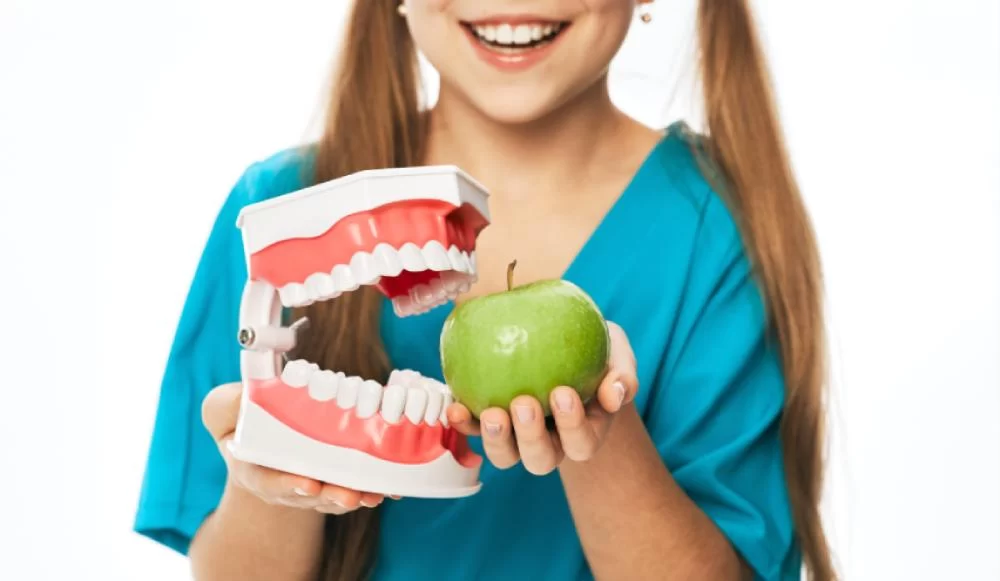
The Benefits of a Healthy Diet for Stronger Teeth: How Food Affects Your Smile
- Why Diet Matters for Your Teeth
- Key Nutrients for Healthy Teeth
- Best Foods for Stronger Teeth
- How a Healthy Diet Prevents Common Dental Issues
- Real-Life Stories: Diet’s Impact on Oral Health
- How to Build a Teeth-Friendly Diet
Why Diet Matters for Your Teeth
Our diet plays a crucial role in the health and strength of our teeth. While brushing and flossing are vital for maintaining oral hygiene, what we eat significantly impacts the long-term health of our teeth and gums. A healthy diet can help prevent tooth decay, gum disease, and even enamel erosion. By choosing the right foods, we provide our teeth with the necessary nutrients to stay strong, resist cavities, and maintain a beautiful smile.
Key Nutrients for Healthy Teeth
Certain nutrients are essential for the maintenance and strength of our teeth. These nutrients not only help repair and rebuild tooth enamel but also support gum health and reduce inflammation. Some of the key nutrients include:
- Calcium: A crucial mineral for strong teeth and bones, calcium helps to keep tooth enamel strong and healthy.
- Vitamin D: Helps the body absorb calcium, which is necessary for optimal bone and tooth health.
- Phosphorus: Works alongside calcium to maintain the strength and integrity of teeth and bones.
- Vitamin C: Essential for gum health, vitamin C helps prevent gum disease and supports the healing of gum tissues.
- Fluoride: Strengthens tooth enamel and helps prevent cavities by making teeth more resistant to acid attacks from plaque bacteria.
Best Foods for Stronger Teeth
There are many foods that can contribute to stronger, healthier teeth. These include nutrient-dense options that support oral health and provide the vitamins and minerals necessary for tooth enamel repair. Some of the best foods for your teeth include:
- Dairy Products: Milk, cheese, and yogurt are rich in calcium and phosphorus, which are key to keeping tooth enamel strong.
- Leafy Greens: Spinach, kale, and other leafy greens are high in calcium and vitamin C, promoting both strong teeth and healthy gums.
- Apples and Carrots: These crunchy fruits and vegetables help clean teeth and stimulate saliva production, which naturally cleanses the mouth and neutralizes acids.
- Nuts and Seeds: Almonds, sunflower seeds, and walnuts are rich in calcium and healthy fats that support gum health.
- Green Tea: Rich in antioxidants, green tea can help reduce inflammation and bacteria in the mouth, promoting gum health.
How a Healthy Diet Prevents Common Dental Issues
A healthy diet can prevent several common dental problems, including:
- Cavities: Consuming foods rich in calcium and phosphorus helps strengthen enamel, making teeth more resistant to cavities.
- Gum Disease: Vitamin C is essential for preventing gum disease, and foods rich in antioxidants, like green tea, help reduce inflammation.
- Tooth Sensitivity: A balanced diet supports enamel integrity, preventing the wearing down of teeth that can cause sensitivity.
- Bad Breath: A diet high in water-rich foods like fruits and vegetables can help maintain proper hydration, reducing bad breath caused by dry mouth.
Real-Life Stories: Diet’s Impact on Oral Health
Take Jane, for example, a 34-year-old mother who struggled with recurring gum inflammation. After consulting with her dentist, she adjusted her diet to include more vitamin C-rich foods like oranges and strawberries. Over time, her gum health improved significantly, and the inflammation subsided.
Another story is from Mark, a 45-year-old who suffered from tooth sensitivity. After incorporating more calcium-rich foods like cheese and milk into his diet, his sensitivity gradually decreased, and his teeth felt stronger.
These real-life stories highlight the significant impact that diet can have on oral health. Small changes to your eating habits can lead to long-term benefits for your teeth and gums.
How to Build a Teeth-Friendly Diet
To build a diet that supports strong, healthy teeth, focus on incorporating foods that are rich in the nutrients mentioned earlier. Aim to:
- Include at least two servings of dairy products each day to provide your body with calcium and phosphorus.
- Consume plenty of fruits and vegetables, particularly those that are high in fiber, to stimulate saliva production and clean your teeth naturally.
- Incorporate whole grains, nuts, and seeds into your meals for a healthy dose of vitamins and minerals.
- Drink plenty of water throughout the day to maintain hydration and prevent dry mouth.
By making these changes, you’ll not only improve your overall health but also give your teeth the best chance to stay strong and decay-free. Don't forget that regular dental check-ups and proper oral hygiene are equally important in maintaining your smile.







 Equitas Health Short North Medical Center3.0 (96 review)
Equitas Health Short North Medical Center3.0 (96 review) Dr. Angela M. Stout5.0 (2 review)
Dr. Angela M. Stout5.0 (2 review) Newport Dental & Orthodontics4.0 (166 review)
Newport Dental & Orthodontics4.0 (166 review) Van Nuys Dental Care4.0 (23 review)
Van Nuys Dental Care4.0 (23 review) MapleTree Pediatric Dentistry4.0 (102 review)
MapleTree Pediatric Dentistry4.0 (102 review) Lakewood Dentistry & Orthodontics4.0 (64 review)
Lakewood Dentistry & Orthodontics4.0 (64 review) The Importance of Oral Health Education During Pregnancy for a Healthy Pregnancy
The Importance of Oral Health Education During Pregnancy for a Healthy Pregnancy Best Tips for Brushing Your Teeth Properly for Healthy Gums: Essential Techniques for Oral Health
Best Tips for Brushing Your Teeth Properly for Healthy Gums: Essential Techniques for Oral Health Why Skipping Dental Checkups Can Lead to Bigger Oral Health Problems
Why Skipping Dental Checkups Can Lead to Bigger Oral Health Problems Advantages of Porcelain Dental Restorations
Advantages of Porcelain Dental Restorations How Can Diabetes Cause Tooth and Gum Problems? Preventing and Managing Oral Health Issues
How Can Diabetes Cause Tooth and Gum Problems? Preventing and Managing Oral Health Issues Healthy Habits for Promoting Good Oral Health and Hygiene: Tips for a Healthy Smile
Healthy Habits for Promoting Good Oral Health and Hygiene: Tips for a Healthy Smile